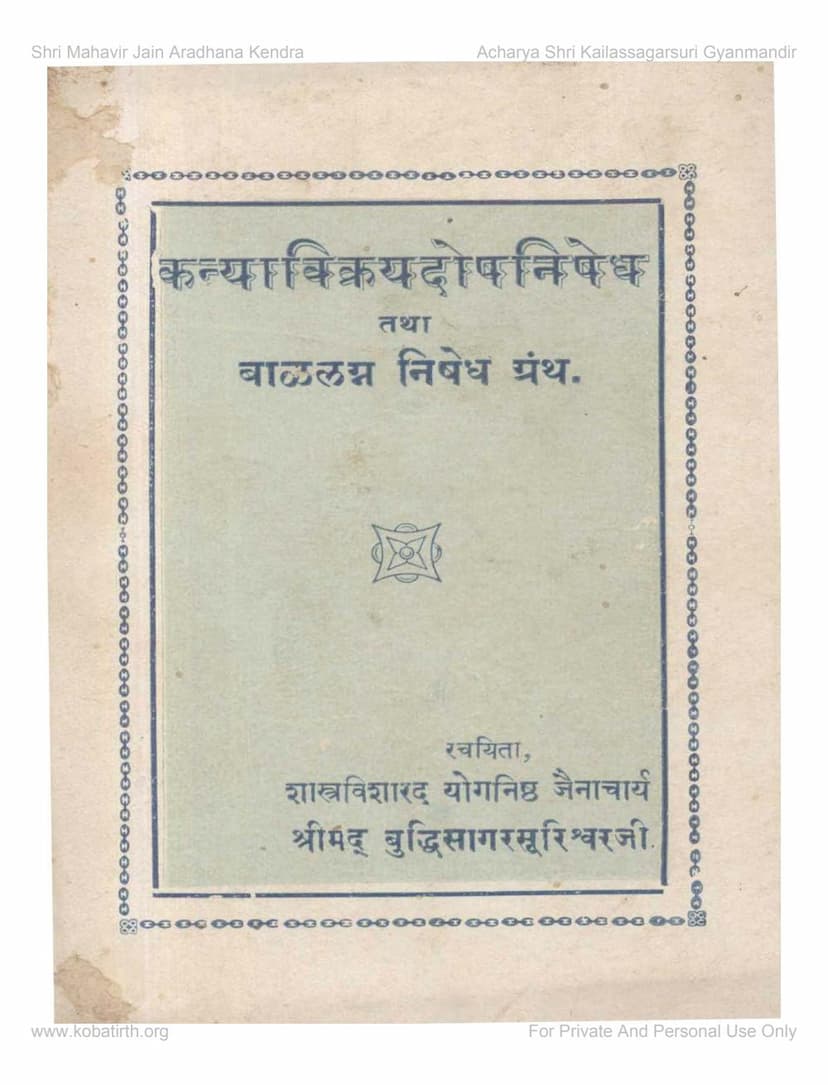Kanya Vikray Dosh Nished Tatha Ballagna Dosh Nished Granth
Added to library: September 2, 2025

Summary
This Jain text, "Kanya Vikray Dosh Nished tatha Balagna Dosh Nished Granth" by Acharya Buddhisagar, published by Adhyatma Gyan Prasarak Mandal, is a comprehensive treatise that aims to vehemently condemn and abolish the harmful practices of selling daughters (Kanya Vikray) and child marriages (Balagna).
The book is presented as a crucial intervention against these deeply entrenched social evils that were prevalent in Jain society, particularly in regions like Gujarat and Kathiawad.
Here's a summary of its key aspects:
Core Message and Purpose:
- Condemnation of Kanya Vikray (Daughter Selling): The primary focus is to highlight the severe sin and negative consequences associated with selling daughters for financial gain. The author argues that this practice is antithetical to Jain principles of compassion and non-violence.
- Prohibition of Child Marriages (Balagna): The text also strongly advocates against child marriages, explaining their detrimental effects on the physical, mental, and spiritual well-being of both the children involved and future generations.
- Guidance for Social Reform: The book serves as a call to action for the Jain community to abandon these harmful traditions and embrace practices that align with ethical and religious teachings.
Arguments and Content:
- Religious and Ethical Basis: The author draws upon Jain scriptures and principles to argue against these practices. He emphasizes the importance of compassion (daya) and non-violence (ahimsa) and how selling daughters and child marriages violate these core tenets.
- Social and Economic Consequences: The text details the negative social and economic repercussions of these practices. It highlights how child marriages lead to weakened progeny, increased widowhood, societal disruption, and a decline in the overall well-being of the community.
- Moral Decay and Spiritual Harm: The book emphasizes that such practices lead to moral degradation, corrupt practices (like bribery among community leaders), and a spiritual decline, ultimately leading to unfavorable rebirths and suffering.
- Illustrative Narratives and Examples: To powerfully convey its message, the book includes illustrative stories and examples of individuals who suffered due to these practices, or who championed their reform. These narratives serve as cautionary tales and inspiring examples.
- Call to Action for Community Leaders: The author addresses community leaders, elders, and influential members, urging them to take responsibility for enacting and enforcing reforms within their communities.
- Emphasis on Education and Awareness: The book implicitly and explicitly calls for greater education and awareness about the harmful effects of these traditions, aiming to enlighten the community and foster a desire for change.
- Financial Contributions and Support: The introductory sections acknowledge the financial contributions of various individuals and organizations that supported the publication of the book, underscoring the community's collective effort towards social reform.
- Historical Context: The text provides a glimpse into the social conditions of the time, discussing how practices like Kanya Vikray were rampant and considered a significant societal problem that needed immediate intervention.
- Critique of Societal Hypocrisy: The author also critiques the hypocrisy of those who claim to uphold Jain values while engaging in or tolerating these unrighteous practices.
Overall Impact and Significance: Acharya Buddhisagar's work is a significant piece of Jain social reform literature. It reflects a proactive effort by Jain scholars and community leaders to address and eradicate deeply ingrained social ills. The book serves as a testament to their commitment to upholding the ethical and spiritual ideals of Jainism for the betterment of society. It's a powerful plea for moral rectitude, societal progress, and adherence to righteous conduct.